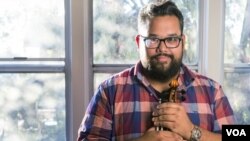Vijay Gupta is known to classical music lovers across the United States.
Gupta serves as first violinist for the Los Angeles Philharmonic. In that job, he often plays to large crowds, including many very rich people.
When he is not performing, he organizes concerts for homeless people. “They have reminded me why I became a musician,” he said.
Last week, Gupta was recognized for being a founder and the artistic director of Street Symphony. The group has performed at homeless shelters, jails and halfway houses for about eight years.
Gupta is among the 25 winners of the 2018 MacArthur Fellowship, commonly known as the “genius grant.” Each winner will receive $625,000 over five years to use as they wish.
The money is coming from a private group, the John D. and Katherine T. MacArthur Foundation. It awards grants to people whose work it considers exceptional and that “inspires hope in us all.”
Gupta said he got the idea for Street Symphony while teaching Nathaniel Ayers, a trained musician whose mental illness led to homelessness. Ayers’ life was the basis for the movie “The Soloist.”
“I grew up around mental illness,” Gupta said, noting that he has experienced it himself.
The 31-year-old grant winner said he does not know yet how he will spend the money. He has been a performer since age seven and the award will give him “space to breathe, plan and look ahead.”
Another winner is Rebecca Sandefur, an associate professor of sociology and law with the University of Illinois at Urbana-Champaign. Sandefur said she was shocked to find out she had won a MacArthur Fellowship.
The Associated Press says her research actively supports new ways to involve poor communities in the U.S. justice system.
47-year-old Sandefur created the first national mapping of civil legal aid providers. It shows which states had the financial resources to provide such aid and which did not.
She also found that the cost of legal services is only one of the things preventing poor people from getting lawyers. Among the others are fears about unfairness in the legal system.
Sandefur noted that a lot of attention has been paid to problems with the criminal justice system. But she said that more attention must be paid to the civil side of the law, which also affects millions of people.
In civil law, a person could lose their home, be unable to see their children after a marriage ends or be denied unemployment money, she said.
Sandefur said the award would be important in advancing her work.
Another MacArthur recipient is William J. Barber II, who leads Greenleaf Christian Church in Goldsboro, North Carolina. He also set up a leadership development organization called Repairers of the Breach. In 2017, Barber began a series of “Moral Monday” demonstrations near the North Carolina state Capitol building. The goal was to protest economic and racial inequalities, such as laws preventing people from voting.
On the day the award was announced, the clergyman was taking part in a “Fight for $15” wage protest outside of the Chicago headquarters of McDonald’s. Barber was arrested at the protest. He told The Associated Press that the MacArthur honor just means he has more work ahead of him, not less.
“They don’t share these grants so that you sit down. They hope and believe you will do more things,” said Barber.
I’m Alice Bryant.
Herbert G. McCann reported this story for the Associated Press. Alice Bryant adapted it for VOA Learning English. George Grow was the editor.
______________________________________________________________
Words in This Story
classical – adj. relating to music in a European tradition that includes opera and symphony
violinist – n. a person who plays the violin
concert – n. a public performance of music
remind – v. to make someone think about something again.
halfway house – n. a center for helping former drug addicts, prisoners, mental health patients or others to adjust to life in general society
genius – n. a very smart or talented person
grant – n. an amount of money that is given to someone by a government, a company, or organization
inspire – v. to cause someone to have a feeling or emotion
breach – n. a failure to do what is required by a law, an agreement, or a duty
moral – adj. concerning or relating to what is right and wrong in human behavior






